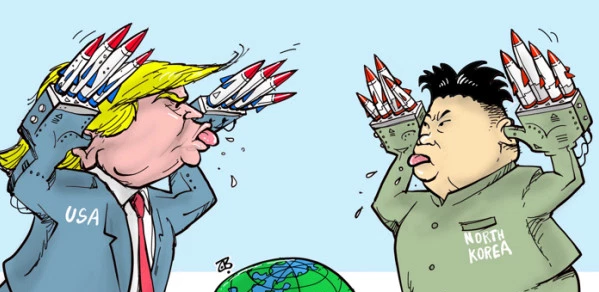The Nuclear Tightrope: Why North Korea is a Serious Threat Under Trump
By Jared Mitovich

Photo credit: Cartoon by Emad Hajjaj. Photo by The Mercury News.
Two men walk on a tightrope, one foot in front of the other, from opposite ends. Slowly, they make their way toward each other. Suddenly, the man from the left starts bolting towards the one on the right. A few yards away from each other, a wind starts to howl, and the man on the right’s blonde hair begins to blow.
The rope squeaks and tilts to the side, and the pudgy one on the left loses their balance but quickly straightens themselves out into a confident stride. The one on the right looks dazed, as if he does not know which direction to go. The wind roars like a lion, its fury perhaps representing the voices of the entire world.
The wind screams because soon enough, one leader will fall off the tightrope; if not, the two will collide with each other. Change is inevitable, and it has to be prepared for. North Korea is no longer a laughing matter.
Even though the likelihood of San Francisco or Los Angeles being obliterated is remarkably low, all Americans and all residents of countries in a reasonable distance to Pyongyang should prepare for something that we’ve been going strong at avoiding the past 75 years: a world war.
Even though a world war may seem a bit exaggerative, it could happen if this crisis does not subside. Nevertheless, many are pondering why the chit-chat between our country and theirs could lead to a world war. Instead, the question that should be asked is simply which unstable head of state will act first: President Trump or Supreme Leader Kim Jong Un?
In the past year or so, North Korea has remarkably upped their game. Regarding both nuclear power and word choice (“dotard”, for instance, has made a return), they’ve gone from forgotten foe to thunderous threat. This is due in part to the election and subsequent inauguration of American president Donald J. Trump. Since announcing his presidential campaign from the glossy marble halls of Trump Tower, Trump has only escalated his threats about North Korea. In some ways, that’s a good thing because it means that the President will do whatever it takes to avoid a military conflict. In other ways, however, it’s potentially life-threatening.
We can trace the roots of Pyongyang’s nuclear escalation to some comments made by President Trump and his administration –– and as long as Trump is in office or some effective action is taken, this train doesn’t seem to be stopping anytime soon. I am not blaming the current White House incumbents for North Korea’s actions (each side has threatened war multiple times), but statistics make one thing apparent.
Analyzing the figures, the number of successful missile tests has doubled from six tests in 2016 to twelve (now thirteen as of November 29) in 2017. This statistic suggests that Trump’s inauguration and his foreign policy may have prompted Kim Jong Un to accelerate his country’s nuclear weapons program.
For instance, on November 20, the United States named North Korea a state sponsor of terror, which could result in further economic consequences and Kim Jong Un’s frustration. It will almost certainly not have an effect on North Korea’s nuclear actions, though, considering dozens of sanctions that attempted to squeeze North Korea of its explosive prosperity were ineffective as well. In fact, on November 29, North Korea launched its most powerful, longest-ranged missile yet. It doesn’t sound like being a state sponsor of terror is stopping them from pursuing their goals.
More exemplary of this point is that on August 8, Trump threatened North Korea with “fire and fury” and promised that the United States was prepared for any action taken by the reclusive republic.
“North Korea best not make any more threats to the United States,” the President proclaimed from his New Jersey estate. “They will be met with fire, fury and frankly power the likes of which this world has never seen before.”
Shortly after –– specifically, 3 hours later –– North Korea put out a statement that set the world on edge and threw the spotlight on the peaceful Pacific paradise of Guam, a United States possession. Pyongyang warned that they were drawing up plans to rain down missiles on the territory, endangering the lives of 160,000 people at the snap of Kim Jong Un’s chubby finger.
Even though Guam never saw a weather forecast calling for flammable precipitation, Japan, a strong ally of the US, has. Twice in one month, the Japanese island of Hokkaido received orders to stay inside due to these North Korean missile launches. Clearly, it’s only a matter of time until North Korea’s deranged Rocket Man decides to make a touchdown with one of his footballs.
But will that step taken by North Korea start a war?
Based on an educated assumption and according to the actions taken, policies proposed, and language spoken by the US and its allies, one should have reason to believe any missile landfall, bomb drop, or cyber blackout caused by North Korea will be responded to with force by one or more countries. Therefore, a declaration of war could possibly follow. But like the last episode of Stranger Things, what happens next is a cliffhanger: either nuclear holocaust or united Korea.
“I believe that North Korea should be taken seriously, as they have made threats and are now equipped with a nuclear program,” said freshmen Noah Hirshfield. “I think that our country should be careful when communicating with North Korea, and we should not take their threats lightly; our government should respond seriously to any threats from North Korea.”
Isabella Frangiosa, another Hills student, agreed that North Korea should most definitely be taken seriously. She said because of “the missile tests they have done and will most likely continue to do, we should take no threat lightly and be on the alert. I think overall, it’s very scary situation and everyone needs to be careful, regardless of where they’re from.”
It seems the United States as a whole agrees with the fact that North Korea is a credible hazard as well. In a poll conducted by SSRS, it was found that two-thirds of Americans see North Korea as a very serious threat, and 68% say that the United States should be an important character in determining the future of the reclusive nation.
The situation with North Korea is by no means an imminent apocalypse that we should be hunkering down for. It is, however, a threat we should keep in mind as the impulsive country continues their missile and nuclear tests. Considering the change in policy regarding North Korea by the Trump administration, it seems it is becoming more and more important to remind ourselves of North Korea’s capabilities. We should still take North Korea seriously because if we push them aside and ignore the threat they pose, any potential destruction they cause will be much more significant.

Jared Mitovich joined the Trailblazer his freshman year as a staff writer. He has helped manage the Trailblazer's social media since his sophomore year, and in his junior year he edited the Opinion section. Now in his final year of high school, Mitovich is looking forward to working with Mackenzie Blowers as Editor-in-Chief along with the entire Trailblazer staff. You can follow him on Twitter at @jmitovich!
Fun fact: Mitovich once met a presidential candidate.














































